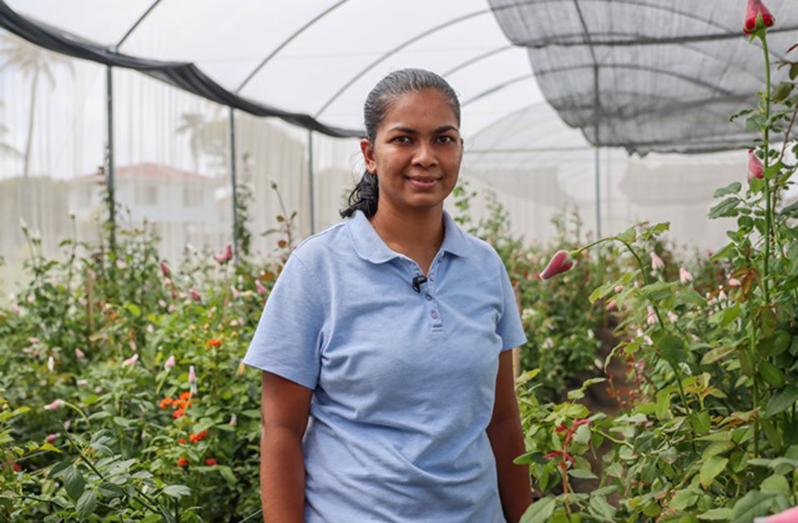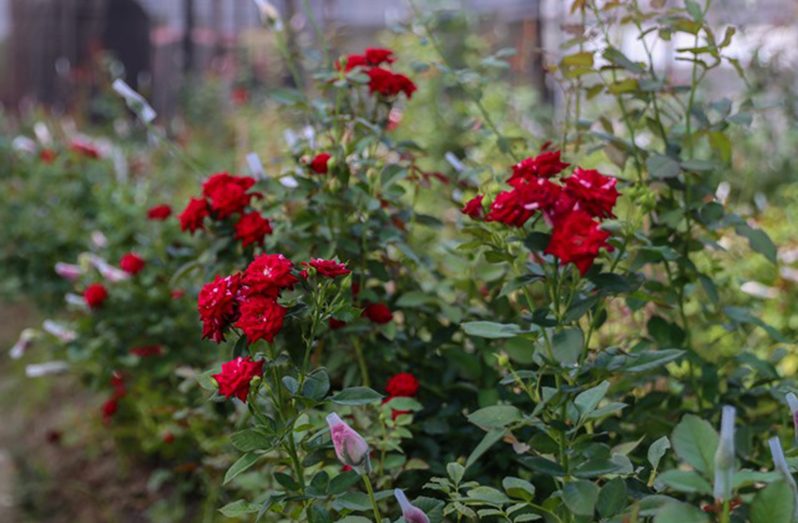PRESIDENT, Dr. Mohamed Irfaan Ali’s One Guyana ‘Cut Rose’ Project continues to make significant progress, with some 1,600 roses being harvested weekly from the shade houses at the National Agricultural Research and Extension Institute (NAREI).
This project is designed to create employment and generate income for single parents.
It is being executed by NAREI in Mon Repos, East Coast Demerara, under the direction of the Ministry of Agriculture.
This was highlighted during an interview with the Department of Public Information (DPI), on Monday by Research Assistant at NAREI, Melissa Ferreira, who noted that, currently, there are four shade houses with 600 plants in each.
She disclosed that approximately 400 roses are harvested weekly from each shade house.
As it relates to the variety of roses within the shade houses, Ferreira emphasised that, “Right now, we have 25 different colours. The types would be the Hybrid Tea (Rose) plants. And then, we also have some miniature variety. But the main variety would be the Hybrid Tea and we have 25 different colour variation of those.”
The research assistant stated that there is an increase in orders for the roses due to the upcoming Valentine’s Day.
“Persons were calling since early last month to place their orders. Based on the amount that we have estimated to harvest, which is 1,600, we have about 1,400 roses ordered in total for Valentine’s Day.”
She added that the institute is also catering for walk-in purchases for Valentine’s Day, “We’ll be busy for valentine since we’re catering for 1,600 orders.”
Before the execution of the ‘Cut Rose’ project, she highlighted that extensive research was done pertaining to the necessary requirements to grow the roses in Guyana, which included the soil type and nutrients.

The research assistant noted that a myriad of soil mixtures and other materials are utilised to boost the growth of the roses.
“In preparing the soil, we use our own mixture which would include clay, white sand, filter press, chicken manure, and paddy shell.
These plants were grafted plants. Grafting is the process of attaching a piece of one plant (bud or scion) to or on top of a stem, root, or branch of another (stock) such that a union forms and the partners continue to grow.
Meanwhile, Research Scientist, Leelawattie Persaud, who is attached to the Horticulture Department at NAREI, reiterated that the project contributes to the income of single parents by improving their livelihood.
She added that this project is extremely unique since, “It is a faster turnover as compared to other agricultural crops in terms of investments, and productions.”
With Guyana being a tropical country and its vast environmental conditions, Persaud stated that Guyana can elevate from being one of the main importers of fresh roses to an exporter in the future.
“Because if we continue and expand at this level in a short period, we can achieve that goal. It can completely change our market’s dynamics and shift it the other way around,” she underscored.
Since its execution, the project has made significant progress with the number of roses being harvested and sold. In addition, a number of single parents have been benefitting.
By the end of 2023, through this project, it is anticipated that rose imports will be reduced by 30 per cent, while also giving single parents in particular, career and training opportunities.



.jpg)








